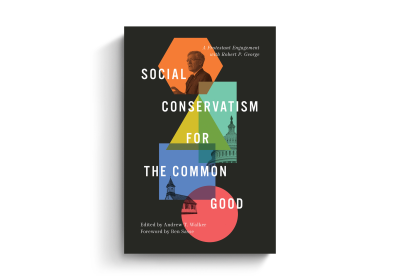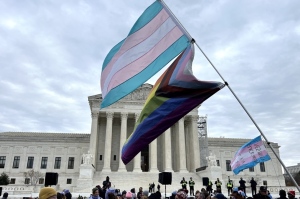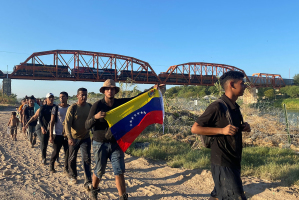The recent book that screams ‘I’m a classic!’: How the Protestant-Catholic alliance was formed (pt 2)

The more one digs in to Social Conservatism for the Common Good (Wheaton: Crossway, 2023), the more one realizes this volume is a “classic,” destined to be much read and much referenced for at least a generation to come.
As I said in part I of this essay review last week, Social Conservatism for the Common Good, edited by Andrew T. Walker and Ben Sasse, is the right book at the right time at what may well be a moment of a tectonic shift in American and Western Civilization.
The culture wars of the last half of the 20th century and the first third of the 21st century in America have produced some previously unimaginable alliances.
It must always be remembered, to paraphrase and expand upon the late Richard John Neuhaus’s profound observation, “politics is downstream from public policy, which is downstream from culture, which is downstream from religion.” And, religion should be understood in this context either as religion in the more traditional sense for those who have rejected traditional spirituality, whatever philosophy or ideology provides for them an ultimate sense of meaning and purpose in life (i.e. Marxism, Secular Humanism, etc.).
Thus, it makes sense that in a culture war in a country as religious as America historically has been, religion would play a crucial role. Social Conservatism for the Common Good explains that the development of the Roman Catholic-Evangelical Protestant Alliance, to the astonishment of all concerned (friend and foe alike), developed into a powerful cultural and political force from the late 1960s up to the present day.
It becomes clear from the outset of these uniformly excellent and quite readable chapters that Robert George, the Roman Catholic legal scholar and philosopher, was, and is, an absolutely essential catalyst for that alliance, which explains Social Conservatism’s subtitle, “A Protestant Engagement with Robert P. George.”
For those of us who have lived through these historic decades, the deep and lasting alliance that was forged by Roman Catholics and Evangelicals was almost unimaginable before it actually happened.
David Dockery, in his chapter, “From Separation to Cobelligerency” does a masterful job of surveying the history of American Protestantism and Evangelicalism’s place within that tradition.
“Evangelicals are men and women who love Jesus Christ, love the Bible, and love the gospel message….Evangelicalism, a cross denominational movement that emphasizes classical Protestant theology, is often best understood as a culturally engaged, historically shaped response to mainline liberalism, on the one hand, and reactionary fundamentalism on the other.”
The soil in which the Roman Catholic-Evangelical Protestant Alliance was forged was one where, as the 1950s progressed, Evangelicals and Catholics began to realize they had more in common with each other theologically than either did with the rapidly declining and secularizing mainline Protestant denomination.
Then, beginning in 1962, the Second Vatican Council (Vatican II) commenced in Rome, and rather remarkably, instituted major reforms which made a significant degree of rapprochement between Evangelicals and Roman Catholics possible. Perhaps most importantly, Vatican II designated Protestants as “separated brethren.” Additionally, Vatican II opened the door for Pope John Paul II to become one of the most eloquent spokespersons for freedom of conscience for all people of faith.
Robert George himself cites the paramount importance of Vatican II in the remarkably informative “Afterword” to Social Conservatism for the Common Good, “Seeking the Truth, Speaking the Truth. A Dialogue between Robert P. George and Andrew T. Walker.”
Dr. George acknowledged, “There needed to be some action on the Catholic side, and I think the Second Vatican Council initiated that action.”
Robby George went on to say this:
“I think Catholics—because of our engagement with Protestants beginning in a certain way in the trenches, the ecumenism of the trenches, in the pro-life struggle, in the struggle to defend marriage and other important moral norms—Catholics have learned from Protestants the importance of the Bible should be part of our personal spiritual lives, that the devotional use of the Bible is important, that reading the Bible for ourselves and not just listening to the proclamations of Scripture Mass on Sunday is necessary. Understanding the Bible is really important.”
Dr. George then explains that from the Evangelical Protestant side, Catholics helped Protestants understand “a profoundly illuminating and thus valuable tradition of thought about moral questions, political questions, metaphysical issues that have been historically nurtured by Catholicism. They find that it is a tradition that Protestants can benefit from, can draw on, can become part of.”
I experienced both the importance of Vatican II and the Alliance of Cobelligerency as it formed and swelled in numbers and influence. Once Vatican II acknowledged Protestants as “separated brethren,” the foundation was there for pro-life Catholics and pro-life Protestants to work together on the common goal of defending the unborn.
Personally, I was introduced to the rich cultural and spiritual heritage of Catholic social thought through the centuries during my time as a student of Dr. Paul Ramsey (himself a Methodist) but thoroughly steeped in classical Catholic thought. He also attended part of Vatican II and lectured his students on its importance when I was an undergraduate in his classes in 1967 and 1968.
When I was elected in 1988 as the head of the Southern Baptist Convention’s Christian Life Commission, I was the first “baby boomer” agency head in that denomination. I was 41, and I was 14 years younger than the next youngest agency head. And the average age of the agency heads was approximately 60.
When I came to Nashville, I got involved in the pro-life movement and I met and got to know as a friend and colleague the Roman Catholic Bishop of Nashville. We had dinner together with my wife. There was an event in Nashville I attended with several of the Southern Baptist agency heads and when the Roman Catholic Bishop came in, he greeted me, said, “Brother Richard, Good to see you,” and embraced me. I thought the other Southern Baptist agency heads were going to faint. It was obvious that none of them knew him and they were shocked that we would embrace. All of these men had come to maturity and lived their adult lives with the pre-Vatican II Catholic church. All of my experience in ministry had been with the post-Vatican II Catholic church. A very different institution indeed!
This does not mean that Evangelicals and Catholics did not acknowledge their differences. In various Evangelical-Catholic joint statements, Catholics acknowledged they believed Evangelicals truncated the Gospel by refusing to acknowledge the authority of the Catholic traditions beyond the Apostles. And the Evangelicals felt that the Catholics added to the Gospel by giving authority to the leading of the church as a continuity with the apostolic tradition. Nevertheless, having acknowledged these major differences, they were going to jointly fight in culture for the permanent things, among them the protection of life, marriage, freedom of conscience, and religious liberty, understanding that civilization itself was at stake.
Both Robby George and Andrew Walker remind each other and the readers of the wise and prescient words imparted to each of them personally by Richard John Neuhaus:
“We have to remember that we are not in charge of making things turn out all right. That’s God’s job. We are in charge of being faithful. We’re just supposed to be faithful. The rest is God’s part!”
Dr. Richard Land, BA (Princeton, magna cum laude); D.Phil. (Oxford); Th.M (New Orleans Seminary). Dr. Land served as President of Southern Evangelical Seminary from July 2013 until July 2021. Upon his retirement, he was honored as President Emeritus and he continues to serve as an Adjunct Professor of Theology & Ethics. Dr. Land previously served as President of the Southern Baptist Convention's Ethics & Religious Liberty Commission (1988-2013) where he was also honored as President Emeritus upon his retirement. Dr. Land has also served as an Executive Editor and columnist for The Christian Post since 2011.
Dr. Land explores many timely and critical topics in his daily radio feature, “Bringing Every Thought Captive,” and in his weekly column for CP.




























